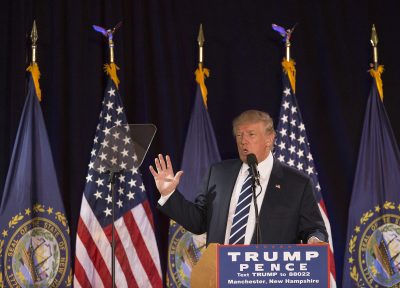
After Donald Trump’s shocking win on Tuesday, some higher educators in Boston are concerned with changes that could potentially happen to higher education institutions during his presidency.
Nancy Thomas, director of the Institute for Democracy and Higher Education at Tufts University, who works with hundreds of campuses throughout the country, said it is difficult to determine Trump’s views on higher education.
“There are some policy issues on the table, so I certainly think that some of the issues on college and open access, forgiveness of student loans … it’s very hard to know where he stands on these issues,” Thomas said. “I think that those [issues], which are directly affecting college students, will be affected.”
While the outcome of the election was not what she had originally predicted, Thomas said the real work moving forward begins now.
“Learning for informed and active involvement in our political life is something that college students should be doing 365 days a year,” Thomas said. “We have to do better on educating students to be politically active, politically informed, concerned about that state of American democracy and willing co-creators of the next form of democracy.”
Thomas urged that concerned and shocked college students to keep fighting for change.
“Your generation is bigger, it’s smarter, it’s more educated and it’s more diverse than any other prior generation,” Thomas said. “You have power. Use it.”
Jay Halfond, an education professor in Boston University’s Metropolitan College, wrote in an email that the differences between Hillary Clinton and Trump’s comments on higher education were dramatic, and likely offer insight into the president-elect’s future policies.
“Obama’s administration had declared war on for-profit schools, which Clinton would have continued – Trump is likely to relax that. Clinton would have stressed greater access and affordability, which Trump is likely to ignore,” Halfond noted. “The Obama administration was aggressive on campus sexual assault – Trump is likely to ignore that concern as well.”
Halfond said he believes that the only positive change to higher education that may arise from a Trump presidency would be the inclusion of more conservative voices on BU’s primarily liberal campus.
“The only area where we might see positive change is that faculty and students with more conservative views might be more willing to contribute to campus dialogue,” Halfond wrote. “Political correctness will be taking a four-year break.”
Several Boston-area students expressed different thoughts on the outcome of the election and the possible changes to higher education they foresee under a Trump presidency.
Anique Barch, a junior at Tufts University, said she was surprised to learn Trump does have plans for higher education, although she’s not sure his motivations come from the right place.
“Throughout this election period, Trump said so many things that were conflicting, so I’m honestly not sure what he values other than himself and his money,” Barch wrote in an email. “I think the biggest thing that could change is the cost of higher education and how loans and debt are handled, but I think Clinton would have worked out similar solutions.”
Mya Neary, a freshman at Suffolk University, said she does not believe higher education will experience many changes throughout the next four years.
“I don’t think [Trump] will have as much of an impact as people think he will,” Neary said. “People sometimes overestimate the power that presidents have, but it’s still a system of checks-and-balances, so I don’t think that higher education will change much.”
Trevor Metcalfe, a junior at Emerson College, said Trump’s views concerning different minority groups may have an adverse effect on higher education as a whole.
“I think many educators will be affected, whether they are women and whether they are immigrants,” Metcalfe said. “I know at Emerson we have a large community of international students … To see his platforms and what they mean for people who participate in education, I would say that it would negatively affect educators and students.”
Metcalfe added that he is not confident in Trump’s ability to reduce student loan debt.
“Decreasing student loan debt is probably not one of his priorities,” he said. “I think it was definitely more of a priority for [Clinton] than it was for Trump.”
Sara Briggs, a freshman in BU’s College of General Studies, said her peers at BU have expressed concern about what policy changes could occur under Trump’s leadership.
“Everyone I talked to is completely freaking out,” Briggs said. “Everyone’s distraught.”






















































































































